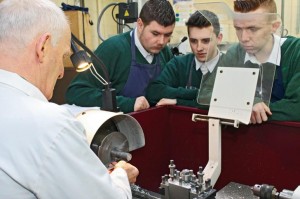
A new report by the education awarding body City and Guilds highlights the perception of vocational education amongst young people and a lack of awareness about its remit.
The report, titled Young People and Vocational Education Choices in Ireland, surveyed 508 young people nationwide through an online survey.
The report contains some worrying developments pertaining to vocational education, which is made up of mostly Post Leaving Certificate, Diploma and Higher National Diploma courses in VEC (Vocational Educational Committee) and Further Education colleges across Dublin.
According to the study, 60% of young people planned to attend university, therefore avoiding vocational education colleges, 21% didn’t know what vocational education meant, 31% did not consider vocational education because of their parents’ preference for university and young people generally saw vocational education as less “challenging” than academic education.
“There is a lack of understanding of what vocational education training is about,” said Philip Sheridan, the accreditations and recognitions manager for City and Guilds Europe. “The three big things are obviously attractiveness, awareness and accessibility, we’re very weak when it comes to vocational training.” Philip said that vocational education needed to be re-established within the Irish education system, which would save it from negative perceptions. Ultimately, he said, “it’s an attitude change that needs to take place.”
“I think the City and Guilds report is a bit out of touch,” said Dan Bradley the Principal of Ballsbridge College. “The proof is there for all to see. 36,000 take PLC courses each year, that number of people won’t take something unless it’s worthwhile. Ask anybody who has taken a PLC course and they will say it’s the making of them.”
Dan said that the courses on offer by his college – ranging from courses in business, computers, community development and applied psychology – offer a practical approach to topics that can be used as a basis for further study.
Vocational education training in South Dublin has an impressive legacy; overall there are five or more VEC or further educational institutions – not to mention one of the largest universities. In Dublin 4 specifically, the major players remain Ballsbridge College and Ringsend College. The latter has rebranded over the past year to appeal to a broader spectrum of students and enhance its creditability as a viable vocational education option.
“There are hundreds of further education courses being offered across the city in the many colleges of further education,” said Donnchadh Clancy, the Principal of Ringsend College. “The system is designed to give more young people access to third-level, and not necessarily people who come from an economically advantaged background. You just have to encourage people to aim high.”
Ringsend College offers a wide array of courses including computer systems, PC maintenance and business administration and has special links to the National College of Ireland, providing options for further study.
The City and Guilds report was the first of its kind in the country. It was split into two main categories based on gender: males (51%) and females (49%). The study also tried to ensure all the major age groups were represented, with 15-year-olds making up 21% of the sample and other age groups making up the remainder. The study also spoke to parents’ councils, teachers and people involved directly with the children to get a better understanding of their general perceptions involving vocational education.
Mick Leonard head of metalwork and engineering shows the students of Ringsend College how to use the lathe.
For more information on further education and PLC courses
go to www.cdetb.ie
By Liam Cahill

